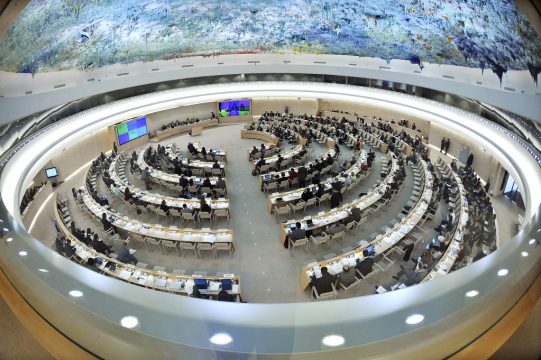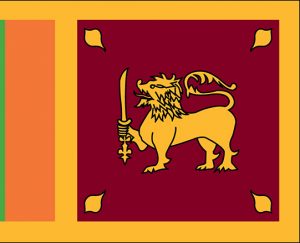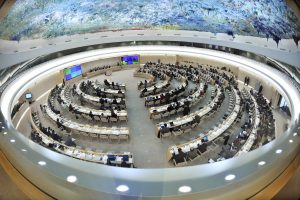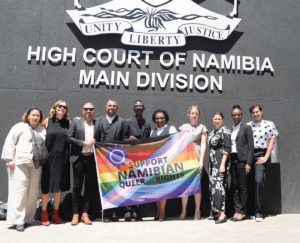| CASE NAME | Rosanna Flamer-Caldera v Sri Lanka 134/2018 |
| COUNTRY | Sri Lanka |
| COURT/ TRIBUNAL | CEDAW Committee |
| STATUS | Decision adopted 21 February 2022 |
Summary
This complaint, submitted in August 2018, challenged the criminalisation of lesbians and bisexual women in Sri Lanka. It was submitted by Rosanna Falmer-Caldera, a Sri Lankan lesbian woman and Executive Director of EQUAL GROUND, an LGBT organisation. She argued that the Sri Lankan Penal Code, which was amended in 1995 to criminalise same-sex sexual conduct between women, violates her human rights as protected by the Convention on the Elimination of All Forms of Discrimination against Women (CEDAW). Sri Lanka has ratified both the Convention and the Optional Protocol, the latter of which allows individual complaints to be considered by the CEDAW Committee. This ground-breaking case was the first time the Committee considered an individual complaint relating specifically to the criminalisation of lesbian and bisexual women.
Case Details
The criminalisation of same-sex sexual conduct in Sri Lanka has its origins in 19th century British colonial law. Introduced in 1883, section 365A originally criminalised “any act of gross indecency” between males. In 1995, when reforming the Penal Code, the government ignored recommendations to repeal the provision and instead amended s365A from “male person” to “person”, bringing lesbian and bisexual women within its remit. Anyone convicted of a gross indecency offence can be imprisoned for up to two years.
The Sri Lankan Constitution explicitly prevents any legal challenge to the validity of laws that are already in force. Constitutional challenges can only be brought to bills that have not yet been passed into law. The complainant in this case is therefore unable to use the Sri Lankan courts to challenge the existing law.
The gross indecency provision engenders prejudice and discrimination against lesbian and bisexual women in Sri Lanka. It makes them more vulnerable to gender-based violence, harassment and abuse both in public and in family environments. The fear of being discriminated against or even prosecuted because of the existing law prevents them from approaching public bodies, such as the police, for assistance in situations of forced marriage, rape and violence.
Consequently, this case specifically highlighted the intersectional impact of the criminalising provisions on lesbian and bisexual women, who face discrimination both because they are women and because they are lesbian or bisexual.
The Parties
The case was brought by Rosanna Flamer-Caldera.
The case is against the State of Sri Lanka.
An amicus brief in support of the case was submitted by Dianne Otto, Professorial Fellow at Melbourne Law School.
Applicable Law
Rosanna Flamer-Caldera argued that the criminalising provisions violate a number of her rights as protected by the Convention. These include:
| RIGHTS | PROVISIONS |
| Article 2 of the CEDAW obliges the Sri Lankan government to “condemn discrimination against women in all its forms” and commit to pursuing a “policy of eliminating discrimination against women”. This is the core obligation of the Convention and it is violated by laws that criminalise same-sex activity between women. The complainant’s case is that her experience of living under the threat of the Penal Code has a particular impact upon her because of the status of women within Sri Lankan society. The law marginalises lesbian and bisexual women, rendering them more vulnerable to abuse and discrimination, and violating the State’s obligation to protect women from gender-based violence. | Article 2(a)(d)(e)(f)(g) |
| Under Article 5, States must “modify social and cultural patterns of conduct” with the aim of eliminating prejudices and practices that are “based on the idea of inferiority or the superiority of either of the sexes or on stereotyped roles for men and women”. The complainant argues that the prohibition of same-sex conduct between women is based on entrenched patriarchal attitudes of gender roles that reduce women to a particular reproductive function. It also gives legitimacy to and upholds such attitudes and prejudice within wider society, perpetuating discrimination and harassment towards those whose appearance and/or lifestyle does not conform to heteronormative and gendered expectations. In her complaint, the complainant explains the numerous ways in which she has personally been subjected to damaging stereotyping and vilification within Sri Lankan society because she is both a woman and a lesbian. | Article 5 |
| Article 16 requires States to take all appropriate measures to eliminate discrimination against women in relation to marriage and family relations. The complainant has provided the Committee with an account of the impact that the criminalising provisions have had on her relationships, and how difficult it has been for her to find a Sri Lankan partner for fear of persecution and harassment. She argues that the criminalisation of same-sex sexual activity violates the right of lesbians and bisexual women to dignity, autonomy and choice in relation to their sexuality and their relationships. | Article 16 |
Relief Sought
Rosanna Flamer-Caldera sought a wide range of remedies, beginning with the repeal of section 365A by the Sri Lankan government and a declaration by the CEDAW Committee that the criminalisation of same-sex consensual relationships between adult women is contrary to the Convention. She also sought amongst other things, the wider decriminalisation of consensual same-sex activity in private between adults and effective protection from gender-based violence against women based on the intersection of their sex and sexual orientation.
Decision
The Committee decided that Rosanna Flamer-Caldera’s rights had been violated by the criminalisation of same-sex sexual intimacy in Sri Lanka. Specifically, the Committee found that s365A violated her right to non-discrimination (Article 2 (a) and (d)-(g)), her right to be protected from gender-based violence (Article 2(c)-(f), Article 5(a)), her right to participate in the public and political life of the country (Article 7(c)), her right to equality before the law (Article 15(1), and her family rights (Article 16). It also found that in maintaining criminalisation, Sri Lanka was failing to meet its obligations to counter gender stereotypes and prejudices (Article 5(a)).
The Committee made the following recommendations
Concerning the author of the communication (Rosanna Flamer-Caldera):
- Take immediate and effective action against the threats, harassment and abuse to which the author has been subjected, including through the adoption of preventative and protective measures and, where appropriate, initiate criminal procedures to hold those responsible to account
- Take all appropriate measures to ensure that the author and her organisation can carry out their activism safely and freely
- Provide the author with appropriate reparation, including adequate compensation, commensurate with the gravity and the ongoing consequences of the violations of her rights.
Generally:
- With respect to section 365A of the Penal Code of 1883, decriminalise consensual same-sex sexual conduct between women having passed the age of consent
- Provide effective protection against gender-based violence against women, including by adopting comprehensive legislation against discrimination against lesbian, bisexual, transgender and intersex women
- Provide adequate protection, support systems and remedies, including reparation, to lesbian, bisexual, transgender and intersex women who are victims of discrimination
- Ensure that victims of gender-based violence against women, including lesbian, bisexual, transgender and intersex women, have access to effective civil and criminal remedies and protection, including counselling, health services and financial support, in line with the guidance provided in the Committee’s general recommendation No. 33
- Collect statistics on cases of hate crimes and gender-based violence against lesbian, bisexual, transgender and intersex women
- Effectively address discrimination against lesbian, bisexual, transgender and intersex women in the workplace
- Take specific and effective measures to ensure a safe and favourable environment for women human rights defenders and female activists;
- Provide training to law enforcement agencies on the Convention, the Optional Protocol thereto and the Committee’s general recommendations, in particular general recommendations Nos. 19, 21, 28, 33 and 35, to raise awareness of the human rights of lesbian, bisexual, transgender and intersex women and so that crimes with homophobic undertones committed against lesbian, bisexual, transgender or intersex women will be understood as gender- based violence or hate crimes requiring active State intervention.
The Human Dignity Trust’s Role
The Human Dignity Trust represented Rosanna Flamer-Caldera in this case, with pro bono support from our Legal Panel member DLA Piper. Counsel were Professor Christine Chinkin, Karon Monaghan QC and Keina Yoshida.




